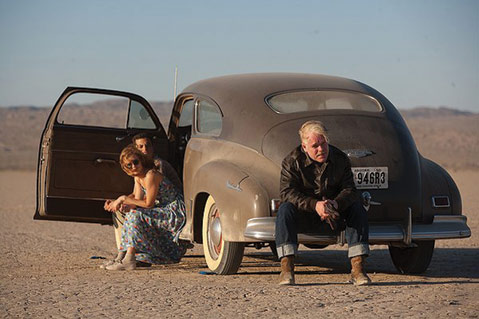The Master
Joaquin Phoenix, Philip Seymour Hoffman, and Amy Adams star in a film written and directed by Paul Thomas Anderson.

Clearly one of the year’s best films, The Master handily supplies a resounding answer to the burning question: How could P.T. Anderson top or at least rise to the level of his 2007 masterpiece There Will Be Blood? As with his previous film, The Master, which craftily and fairly even-handedly tells the tale of an L. Ron Hubbard-like Svengali figure, deals with another flawed, charismatic, and power-maddened character with roots in 20th-century history. Blood’s lusty energy source is oil and its spoils; The Master draws on a god of this “master’s” own devising and a pop psychology construct playing on the desires and spiritual yearning of followers.
But it is not at all Anderson’s intention here to join the chorus of Scientology-bashers. His sharp and mesmerizing script, about the period around 1950 when this new system — dubbed “The Cause” — begins reaching a critical mass of popularity, includes skeptics. (“He’s a Grade A mystic,” says his own editor, “but his work is twisted.”) But in a way, Anderson admires his character’s potently self-determined, if eccentric, path. Fundamentally, The Master is not so much about the seductive and half-mad ramblings of this new religion’s founder but his relationship to a particular roustabout “protégé,” played with astonishing minimalist power by the renascent Joaquin Phoenix, in what may be his strongest work yet.
On that count, among its many fine elements, The Master has at its core an acting tour de force and a two-shot of uncommon, unnerving intimacy. We can palpably feel the manipulation and the symbiotic connection between Philip Seymour Hoffman’s faux Hubbard and Phoenix as Freddie Quell, a volatile and spiritually adrift WWII veteran who speaks out of the side of a crooked mouth and whose desperate attempt to find his psychological sea legs makes him ripe fodder for a mind-controlling sage/father figure. Phoenix and Hoffman hold up under the intensive scrutiny of extended, extreme close-ups, their subtle facial gestures speaking volumes.
Then there is the potency of Jonny (Radiohead) Greenwood’s stunning score: Its sweet and sour, would-be warm but clenched-with-internal-dissonance nature eerily reflects and expands our understanding of Quell’s inner being. Cinematographer Mihai Malaimare Jr.’s work is similarly vital to the filmic fabric of The Master. Here, each shot matters; some are of epic length, while others buzz with a memorable, metaphorical significance. His shots express in imagery the unsettled urgings and torments in ways words could never touch. There are so many ambiguous, hypnotic spirits rumbling through this film, it makes you wonder about the validity of past lives and unsettled psychic scores.



